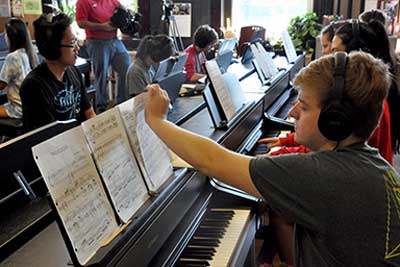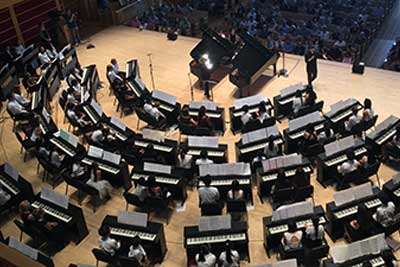Until recently, the type of music lessons a piano student received depended heavily upon the type of instrument he or she was learning. Instruments like trumpet, violin, and voice were taught primarily in ensemble settings (with some individual work mixed in). Piano lessons, however, have traditional been solitary experiences between a single teacher and a single student. As technologies have developed, remote teaching tools, digital piano labs and even online piano lesson programs have given piano students who crave an “ensemble experience” a choice. The question is – which is better? Is the traditional “one on one” method truly the best choice? …or are there benefits to a group piano class that can’t be ignored? As a piano retailer with over 30 years of experience, I get this question a lot. …and my answer might surprise you.
 Individual Piano Lessons: Taking one-on-one piano lessons with a skilled piano teacher makes it easy for the teacher, student, and parent to track the student’s progress. It also allows the teacher to customize each lesson to a student’s individual needs and goals. Without distraction, good private piano teachers can devote their lesson time (and prep time) to finding ways to motivate and develop each student individually. This allows the student to progress at an ideal pace because every moment of lesson time is tailored to him or her. The act of repeatedly meeting personal goals is encouraging and motivational in itself, which also helps the student get more out of their music education.
Individual Piano Lessons: Taking one-on-one piano lessons with a skilled piano teacher makes it easy for the teacher, student, and parent to track the student’s progress. It also allows the teacher to customize each lesson to a student’s individual needs and goals. Without distraction, good private piano teachers can devote their lesson time (and prep time) to finding ways to motivate and develop each student individually. This allows the student to progress at an ideal pace because every moment of lesson time is tailored to him or her. The act of repeatedly meeting personal goals is encouraging and motivational in itself, which also helps the student get more out of their music education.
Individual piano lessons give teachers time to address important things like posture, hand position, fingering, practice habits, and more. They also give piano teachers time to develop real understanding and lasting relationships with their students.
So, the benefits to private lessons are:
- Personalized instruction that is uniquely suited to each student’s needs and goals.
- Custom pacing designed to ideally challenge and motivate each student.
- Extra time for relationship building and emotional support in the lesson.
The downsides are:
- An intense (and sometimes overwhelming) learning environment.
- Few opportunities for peer motivation.
- Difficulty with even, steady tempos, listening skills and improvisation.
There’s no question that private piano lessons are an excellent way to learn to play. That’s why they have been the dominant method for teaching the piano for hundreds of years. …but no piano teacher would say the private lessons environment is perfect. …and – depending on your student – some of the downsides could be problematic. …so what about group lessons?
 Group Piano Lessons: More and more, opportunities to “take a piano class” are popping up around the US. Some individual teachers are branching out and offering group piano classes as well. For kids, it’s an opportunity to make friends and build social skills as well as learning to play. For adults, it’s both a social club and a “we’re all in this together” kind of a mentality. Either way – everyone is starting from scratch and learning is a team effort. It’s an incredibly fun way to begin your musical journey and, thus, fewer students get overwhelmed and quit. Besides – not only would quitting mean missing out on new piano skills, it would also mean abandoning the friends you’ve made along the way! …and since you end up learning from your peers as well as from the teacher, group lessons are less impacted by personality differences or temperament. Group lessons can also make students feel like they are performing real music from the very beginning. With the right curriculum, teachers can setup piano ensembles (like a choir or orchestra, but with pianos) so each student learns a different part. Though simplistic by themselves, the parts become a complete, multi-textured song when played together. This can bring even very beginning students real sense of accomplishment in those crucial first months.
Group Piano Lessons: More and more, opportunities to “take a piano class” are popping up around the US. Some individual teachers are branching out and offering group piano classes as well. For kids, it’s an opportunity to make friends and build social skills as well as learning to play. For adults, it’s both a social club and a “we’re all in this together” kind of a mentality. Either way – everyone is starting from scratch and learning is a team effort. It’s an incredibly fun way to begin your musical journey and, thus, fewer students get overwhelmed and quit. Besides – not only would quitting mean missing out on new piano skills, it would also mean abandoning the friends you’ve made along the way! …and since you end up learning from your peers as well as from the teacher, group lessons are less impacted by personality differences or temperament. Group lessons can also make students feel like they are performing real music from the very beginning. With the right curriculum, teachers can setup piano ensembles (like a choir or orchestra, but with pianos) so each student learns a different part. Though simplistic by themselves, the parts become a complete, multi-textured song when played together. This can bring even very beginning students real sense of accomplishment in those crucial first months.
A good way to understand this approach is to remember band class in school. For me, those are my very best memories. We all struggled and progressed together (those who were better helped those who were struggling) and we ended up making some pretty impressive music. My band teacher, Mr. Easley, is 89 years old and I’m still friends with him! I’m still friends with people I played with in Marching Band and Jazz Band decades ago! That’s the kind of lifelong relationships that are built on a foundation of Group Music Lessons.
So, some very definite benefits to group lessons are:
- The motivation of playing simple parts that sound incredible when played together.
- Learning to listen, to keep an even tempo and to play with others right away.
- The lifelong friendships you pick up along the way.
The downsides are:
- Students learning different concepts at different paces.
- Less individual attention.
We know we all learn differently and have different levels of commitment and talent. Some will “get it” quicker than others and some will practice more seriously than their peers.
 But group piano lessons with a qualified teacher can do a lot to keep students on track. Also, the students learn that they may need to practice a little more to keep up with the class. That “team effort” mindset can be an excellent motivator.
But group piano lessons with a qualified teacher can do a lot to keep students on track. Also, the students learn that they may need to practice a little more to keep up with the class. That “team effort” mindset can be an excellent motivator.
So which method is best for you? Perhaps the best answer to this question is BOTH! I personally believe that group lessons can be a great way to get started. They are fun, they offer the motivation beginners need to keep engaged, and they can expose students to a wide range of people their own age (whatever that age may be!) who are interested in the same things they are. I also know that individual lessons are a great way to advance beyond the intermediate level. If your students is showing real aptitude and you want to give them the opportunity to fully explore their musical talents, you might want to consider private, one-on-one lessons. Every teacher is different and it may take some time to find the right one (Remember – the best players are not always the best teachers.), but when you do find the right teacher for your piano student, the rewards are life-long. Fortunately, we have a list of great teachers in the Phoenix area and can help you find one that’s right for you.
Learning to play the piano is a personal investment that will benefit you for the rest of your life. The important thing isn’t how you go about it, it’s that you do go about it! Consider what will motivate you or your student best and find a teacher who specializes in whatever that is.
You just need to be smart about your choice and find the piano lessons that are right for you. If one teacher doesn’t seem to be the right fit, don’t give up – find another (even if that teacher is further away from where you live). The right teacher is out there, and they’ll be able to make your dream of playing music come true.





